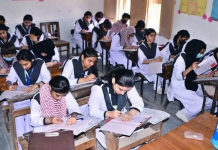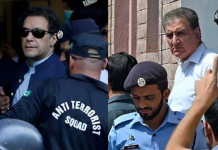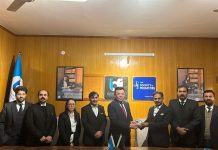ISLAMABAD, OCT 11 /DNA/ – The Institute of Strategic Studies Islamabad (ISSI) hosted a roundtable discussion on “SCO: A Catalyst for Regional Integration and Connectivity”. The event brought together distinguished experts, diplomats, and scholars to discuss the multifaceted role of the Shanghai Cooperation Organization (SCO) in fostering regional cooperation, security, and economic integration.
Ambassador Sohail Mahmood, Director General ISSI, in his remarks, emphasized the SCO’s global salience, its growing organizational and substantive evolution, its significance as the largest transregional platform, and its prominence within the evolving multipolar global order. He added that while ideal outcomes from multilateral platforms like the SCO are desirable, the realities and challenges must be acknowledged. Progress, even if not perfect, should be supported and strengthened. He further added that patience is crucial, as the SCO, like other organizations, evolves at its own pace. Highlighting its growing economic influence, Ambassador Sohail Mahmood noted that SCO members’ trade had risen from $667 billion in 2001 to $6 trillion in 2022, demonstrating the organization’s increasing global relevance and economic heft. Hosting the SCO-CHG meeting is a distinct honour for Pakistan and as the host country, it would ensure the summit’s successful outcome.
Dr. Saif Malik, Director of the Army Institute of Military History, spoke about the critical role of SCO in countering terrorism and ensuring regional stability. He addressed the challenges posed by extremist groups such as ISIS and ISKP and highlighted the need for a comprehensive SCO policy to combat these threats. He also discussed the complexities of regional geopolitics, particularly the relations between Pakistan, India, China, and Russia.
Ms. Amna Masood, Professor at the Faculty of Social Sciences, International Islamic University Islamabad, emphasized the importance of leveraging the SCO forum to enhance Pakistan’s trade and technological partnerships with Central Asian and South Asian nations. She noted that the upcoming CHG meeting presents an unprecedented opportunity for bilateral and multilateral meetings aimed at securing economic and cultural cooperation.
Dr. Uzma Siraj, Head of the International Relations Department at Federal Urdu University discussed the challenges and opportunities for SCO in promoting regional connectivity. She outlined key areas for acceleration, including digital infrastructure, environmental sustainability, and educational exchanges, to foster greater regional cooperation.
Ambassador Babar Amin, Pakistan’s First National Coordinator for SCO, delivered the keynote address, focusing on Pakistan’s achievements during its chairmanship of the SCO Council of Heads of Government. He outlined Pakistan’s efforts in advancing economic cooperation, connectivity, and security initiatives, despite regional challenges. Ambassador Amin highlighted Pakistan’s strategic role in fostering transport links and regional security cooperation through the SCO framework.
Earlier in his Introductory remarks, Dr. Talat Shabbir, Director of the China Pakistan Study Centre (CPSC) at ISSI, welcomed all participants, emphasizing the importance of the SCO as a platform representing almost half of the world’s population and nearly a quarter of the global GDP. He noted that Pakistan’s upcoming hosting of the Council of Heads of Government (CHG) Summit in October 2024 presents a pivotal opportunity for further multilateral cooperation in trade, peace, and regional stability.
In his concluding remarks, Ambassador Khalid Mahmood, Chairman of ISSI’s Board of Governors, commended the timely organization of the roundtable ahead of the CHG Summit. He reflected on the critical role of the SCO in addressing regional security and economic challenges, and underscored the need for greater coordination among member states to realize the full potential of the organization.
The event concluded with a lively Q&A session, during which participants discussed various aspects of regional cooperation, security, and the future of SCO in the evolving global landscape.
















